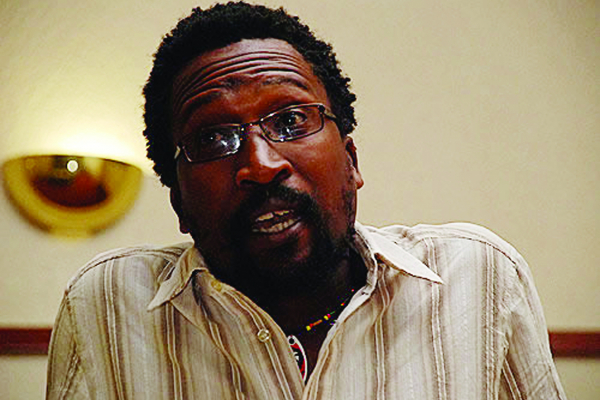
Opinion: Takura Zhangazha
THE late Masipula Sithole taught me (and many others) how to perceive and think about our country, Zimbabwe’s politics.
Not only formally via the university lecture room, but also more significantly via informal engagements with him, long after we had graduated from the Political and Administrative Studies degree that most of my own university peers (R97s) regarded with great derision. And I promise you, we were never favourites in University of Zimbabwe (UZ) social and future scenes.
Another venerable lecturer at that time was AM Kambudzi, now working for the African Union, who taught us, at a specific time in the late 1990s and in-between John Stuart Mill motivated lectures, that there was no need for a Chicago pie franchise in the heart of Harare, Zimbabwe. Let alone that the packets had a Chicago City skyline emblazoned on them. In Harare.
Or the late John Makumbe, who, because of his albinism and much to the humour of the UZ Students Union “galas”, would always refer to himself as ‘the only white man from Buhera.
And it would be he who was to teach us, in a very abrasive way, what local government, in its democratic sense should be.
Then there was also Bertha Chiroro who took us through the motions of understanding ‘State, Politics and Society’ in what was then referred to as the ‘Third World’. And how she taught us that we should always think, intellectually at least, beyond our own borders.
Or Solomon Nkiwane giving us a run down on “international relations” and Zimbabwe’s difficult placement in the same. Albeit briefly.
- Chamisa under fire over US$120K donation
- Mavhunga puts DeMbare into Chibuku quarterfinals
- Pension funds bet on Cabora Bassa oilfields
- Councils defy govt fire tender directive
Keep Reading
In between the suspensions for engaging in student activism we learnt that there was always a greater cause and struggle as to how we perceived and were perceived by our own society. And so we learnt from the above and below cited public intellectuals of our “wannabe intellectual” heyday.
By the time I met the legendary Morgan Tsvangirai (personally and subsequently in the company of Hopewell Gumbo, Nelson Chamisa, Phillip Pasirayi, Innocent Mupara, Ellam Gozho, Artwell Ruzivo under the aegis of the Zimbabwe National Students Union ((Zinasu), I had already encountered the likes of Brian Raftopolous (whose surname we couldn’t quite pronounce), Lloyd Sachikonye, both of whom were at the then reputable Institute of Development Studies which is now a computer centre.)
And also Ibbo Mandaza, the late Sam Moyo and believe it or not Joyce Kazembe (Zec deputy chairperson as at present) as the key persons of what was then the Southern African Political Economic Series (Sapes) Trust.
And the enlightening feminism of Prof Patricia McFadden, Everjoice Win, Nancy Kachingwe and Prof Rudo Gaidzanwa.
However we never understood what public intellectualism in the late 1990s meant to the future of the country. If anything at all. And in this it turned out to be phenomenal.
As student leaders of that time, we knew that our limited intellectualism was also associated with our proximity to opposition politics. We were led, at that time, by others who would prove to be legendary in their own right.
The likes of Munyaradzi Gwisai and Tafadzwa Choto (who taught us Marxism/Trotskyism), Brian Kagoro, Tawanda Hondora (who liberated us from student leadership suspensions at no legal cost), Tendai Biti (who dabbled in representing private capital and labour- an amazing feat if ever anyone asks you), Arthur Mutambara (who addressed us at the University of Zimbabwe public transport rank prior to the 2000 elections and eventually joined the 2009 short lived Government of National Unity as deputy prime minister) and Lovemore Madhuku (who initially had a people centred approach to human rights activism). They may not have understood it at the time, but they were organic intellectuals. And as Castro says: “ History will absolve them.’
What we didn’t know, at that time, as sons and daughters of lower class peasants and workers, was that it would somehow and eventually become our turn to represent and protect the intellectualism of younger generations of activists that would come after us. Not only at the UZ, but in the many other universities that would be spawned in the name of Zanu PF’s expanded access to education. In the process we forgot about the lived reality that was the liberation struggle. By birth, by design and by default.
Nor did we have (enough) access to the internet to understand our own African placement in contextual global history.
Where we consider public intellectuals of contemporary times we can list the likes in our time of Gatsheni- Ndhlovu (an ardent decoloniality intellectual, if he can at all be labelled as such), Hayes Mabweazara (with a firm understanding of media freedom in Southern Africa), Eldred Masunungure (who incidentally taught me an undergraduate course on Introduction to Political Science ), Tendai Murisa (a passionate proponent of the democratic developmental state), Nhamo Mhiripiri and Memory Chirere, who pointed me toward literature in English)
The primary challenge, however, is how to move this commendable intellectualism out of the university lecture room to lived experience by young Zimbabweans. Or to at least attempt at occupying social media and challenging “echo chambers” of populist public opinion.
Especially where it concerns the very necessary fact of Fanonian democratic national consciousness. Pitfalls and all. In all of its criticality.
And contending with the reality that we have arrived at a period in which being a public intellectual is less appreciated in Zimbabwe . Even in Hegelian terms where it is only done to pursue “recognition”. Or in what would personally be preferably Gramscian intellectualism. And we wont even mention the Cabralist assumption of ‘class suicide’ of the revolutionary intellectual. Despite formal academic qualifications or a lack thereof.











